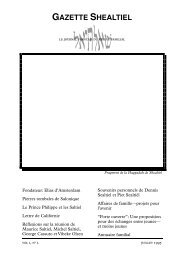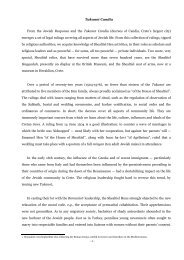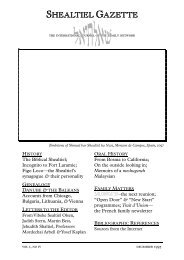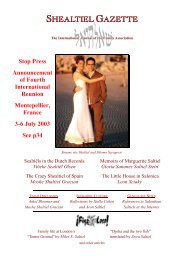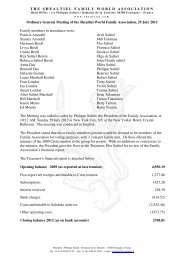a thesis by Flora Jane Satt - Shealtiel
a thesis by Flora Jane Satt - Shealtiel
a thesis by Flora Jane Satt - Shealtiel
You also want an ePaper? Increase the reach of your titles
YUMPU automatically turns print PDFs into web optimized ePapers that Google loves.
<strong>Flora</strong> <strong>Jane</strong> <strong>Satt</strong>—annotated <strong>by</strong> Miles Saltielgroup still in Brest Litovsk, Michael Heilprin had already decidedto go ahead with this plans for an experimental colony locatednear Cotopaxi. His first act, once he had accepted the offer ofSaltiel, was to assign a young lawyer connected with the society,Julius Schwarz, to go to Colorado, make a thorough investigationof the locality, markets, soil, climate, etc., and return a report tothe New York office. Schwarz left New York in January of 1881, butHEAS never received any report from him or word concerninghim.Within a few months of Schwarz’s departure, however Heilprinwas submerged in the more pressing problems of the Russian pogromvictims, and could not spend any more money investigatingthis far-off colony site. The $10,000 required for its establishmenthad already been approved and set aside <strong>by</strong> the society, the rest ofthe ‘colony group’ had arrived from Europe that winter and beganto constitute a ‘dependent immigrant classification’, having beenforced to flee Russia without waiting to sell property, etc. The expensesof tenement living during the winter of 1881-82 had usedup what little they had been able to bring with them and the conditionsin New York, plus the disappointment of delay had eaten upmuch of their enthusiasm. Heilprin had little choice but to permitthe “colony” to go ahead without having received any report ofSchwarz’s investigation.Thus it was that in April of 1882 the twenty “family groups” begantheir long train journey via Kansas City, Pueblo and the RoyalGorge, to Cotopaxi, without many of the things they should havehad. First, they were without any first-hand knowledge of justwhat kind of country they were headed for--save for the descriptionsof the eloquent Mr. Saltiel. Secondly, they were without theirbeloved leader, Saul Baer Milstein. His younger brother, Benjamin,had taken over as Saul Baer was still angry over the matter ofhis daughter Nettie’s unfortunate marriage with his first cousin.That couple was also missing from the group which left New YorkSchwarz-1:The report of 23 October 1882<strong>Satt</strong> is simply mistaken. Schwarz’proposed trip to investigate the site of thecolony never took place. See Appendix1—A note on sources for a review ofthe documents which establish this.On the other hand, once Schwarz arrived,he regarded himself as the manager ofthe colony and described himself as suchon pages 1 and 2 of his October 1882report to HEAS. His tone is euphoric inthe extreme and gives a good sense of theclimate of the times. Sample extracts:“...those who advocated the idea thata Jew cannot make a farmer havebeen refuted.”“Sixty Russian refugees left New Yorkas paupers five months ago. Todaythey are self supporting citizens.”“..spend thousands of dollars forsupplying everyday wants, and youwill breed and raise paupers andbeggars; colonize and you will makeself-supporting citizens.”“Our colony in the Rocky mountainswill always stand forth as a noblemonument of Jewish charity, as thestriking proof of the workingcapacities, of the perseverance, of theearnestness of our Russiancoreligionists…”Schwarz closes with a quote from Cicero:“There is nothing nobler, nothingsweeter, nothing more becoming to afree man than agriculture.”Obviously Schwarz got the outcomewrong, but he paints a picture ofprevailing attitudes, including those ofSaltiel, which however ill-judged were thereverse of villainy. Even seventy yearslater in 1950, <strong>Satt</strong> was no stranger toagricultural euphoria, indeed herconclusion from pages 31 to 34 positivelyembraces the redemptive power of thesoil. See Appendix 1—A note onsources, for an expansion on Schwarz’character as a witness.The winter in New YorkThis was something of a disaster for thepioneers, leading to the depletion of theirremaining funds. The question arises:why didn't some of them take jobs? Thesweatshops of Manhattan were readily tohand. Perhaps as former proprietors andwould-be farmers, they saw such labouras beneath them.17



